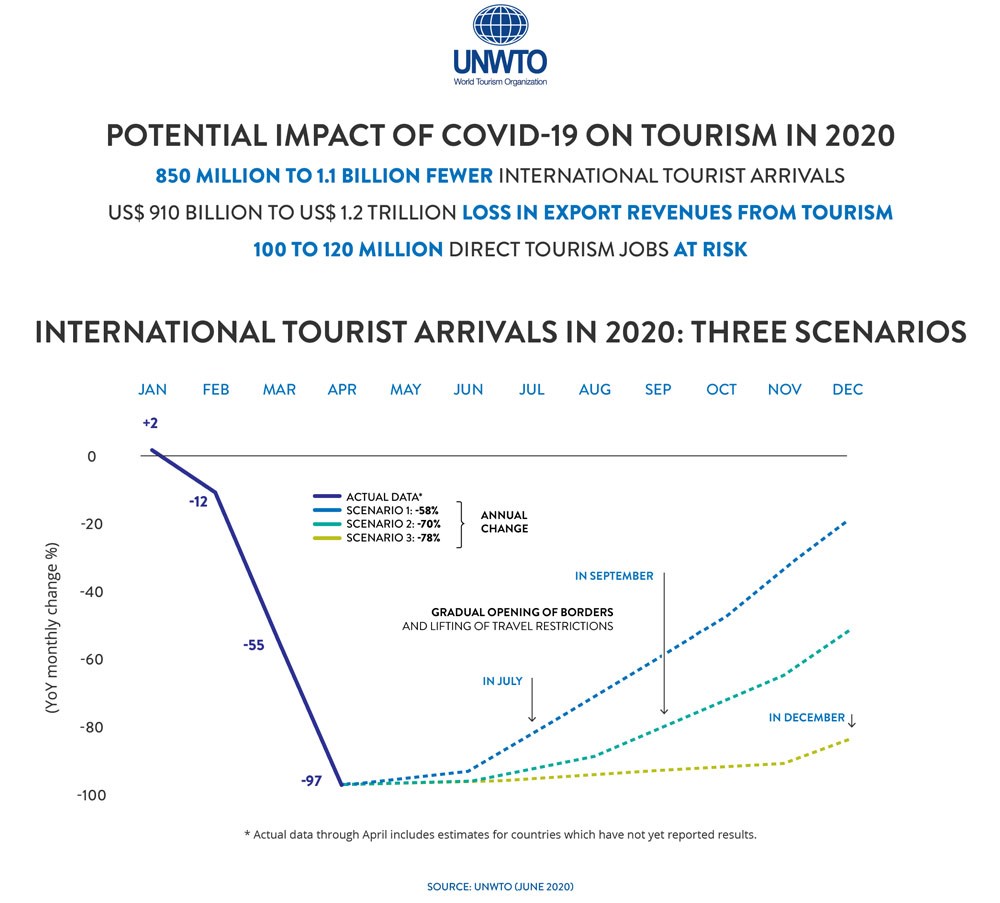COVID-19 Travel Update: What Canadians need to know
July 7, 2020
One of the biggest sectors affected by the COVID-19 pandemic has been travel – as the world slowly begins to reopen, the UNWTO (World Tourism Organization) is calling for the responsible restart of the industry. Their latest study reveals that April (one of the busiest travel times of the year) saw a fall of 97% decline in international tourist arrivals due to the near-universal travel restrictions. While tourism is often an important part of any country’s economy, it is important to consider our own health and the well-being of our community over the economic welfare of the travel industry.

When to go
In Canada, travel restrictions are still high at risk-level 3 (avoid non-essential travel), with the Canada-US border remaining closed until at least July 21, 2020. The closure accounts for land crossings and some trips by water, rather than flights, but there has been very little flight activity between us and our neighbouring country lately. Prime Minister Trudeau is being very cautious about lifting travel restrictions to avoid “a resurgence that will force us to go back into lockdown,” and states that the health and safety of Canadians continues to be the government’s top priority.
When the border does open up, United States national parks will be a hiking/camping destination, in addition to major tourist sites such as Las Vegas and New Orleans, and Walt Disney World resorts set to start opening July 11th. Considering that the United States has the highest number of confirmed cases in the world (more than twice the next highest country, Brazil, as of June 23rd) and climbing by the thousands every day, it may be a good idea to postpone your next visit across the border for a while longer. They have also tested less than 9% of the population, so the actual number of cases may be much higher.
For those who prefer the beaches of the Caribbean, Antigua and Barbuda have been open to international tourists since June 4th – airports are mandating temperature checks for arrivals until at least September, and face coverings are required for those entering any facilities. Jamaica has been open to international visitors since June 15th, also enforcing temperature checks and face coverings. Aruba and the Bahamas are allowing Canadian and international visitors respectively starting on July 1st. The former is imposing some restrictions, including pre-screening for COVID-19, temperature checks, and mandatory quarantine for non-compliance. All of these locations have had, on average, fewer cases than 0.07% of their population, but tested only about 1%.
The highest number of new cases in a day (worldwide) was July 3rd, at over 210,000 in 24 hours. Although the number of active cases in Canada is on a downward trend (at a near-90% recovery rate), this pandemic is far from over. Now may not be the time to try travelling abroad. Instead, try finding the fun in your own neighbourhood – try a social distancing block party, inviting your neighbours to a picnic (each on their own front lawns), or even visiting the patio of a local restaurant with a couple close friends (wearing masks of course!). There are lots of ways to relax and de-stress without exacerbating the pandemic and putting more people’s lives at risk.
What to expect when you return
Upon returning to Canada, you must self-quarantine for 14 days regardless of if you are displaying symptoms of COVID-19. Your quarantine cannot take place where you would be in contact with people who are especially vulnerable, such as those who are over 65 and people with pre-existing medical conditions. Travellers must make their plans to isolate before arriving in Canada, and ensure they will have access to necessities like food and medication while in isolation. Penalties for non-compliance include a fine of up to $750,000, 6 months imprisonment, or both. Many businesses will discourage or refuse entry to those who have been travelling outside Canada in the past 2 weeks, and those who are caught violating their quarantine and risking the lives of others can be held liable for a $1,000,000 fine and/or 3 years in prison. In addition, as of July 7, 2020, wearing a face covering in many indoor public places is mandatory in major cities such as Ottawa.
It important to look at the facts of COVID-19 when considering its impact. We don’t know very much about this virus, but we do know that the best way to prevent the spread is to stay home and avoid unnecessary contact with others. Even though the momentum of fear about the virus has slowed, it is still deadly to the most vulnerable in our population (the elderly and those who are immunocompromised). It is still vital to avoid going out in public unless absolutely necessary – for food, medicine, or medical attention – and if you must go out, wear a face covering and stay 6 feet apart from people who don’t live with you. Hand-washing is also important – 20 seconds of washing with soap and warm water helps breaks down the virus.
COVID-19 will certainly have an impact on things like life and health insurance, and many insurance providers have added a questionnaire to their applications which cover the basic questions it poses. For example, Empire Life now asks about potential exposure to active cases, quarantine measures, whether you have been advised to get tested or gotten tested for COVID-19, and about your travel patterns within 14 days of your application. It is not clear how or if this factors into exclusions related to a person’s policy, but exclusions can only be locked-in at the beginning of a policy. It is always best to have this taken care of before the illness hits – contact shane@curreyinsurance.com to ask about locking in your rate sooner rather than later.
